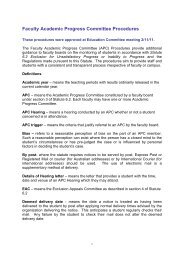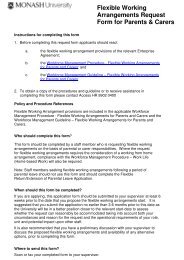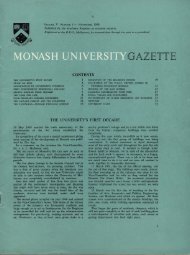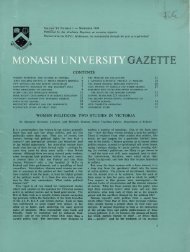No.3-81 May - Adm.monash.edu.au - Monash University
No.3-81 May - Adm.monash.edu.au - Monash University
No.3-81 May - Adm.monash.edu.au - Monash University
- No tags were found...
You also want an ePaper? Increase the reach of your titles
YUMPU automatically turns print PDFs into web optimized ePapers that Google loves.
• An elementary dreillltge ay.tern - doubling ... sewer - in a third world country.Aid for developing areas on drainage Each wet season, elemeDtary orpoorly designed drainage systems indeveloping countries magnify thedevastation or ftoods - in both thedeath and damage c<strong>au</strong>sed by theuncontrolled surge ot water and,with it. stagnant collection, thesubsequent spread or dieeaaes suchas typhoid and cholera.Many of the poorest Dations,however, still must divert all theirresources to meeting the basic day-todayneeds of their people - feeding,clothing and housing them - and theadoption of advanced technologies foreffective drainage is some years off.When these countries are in aposition to address such problems, thesolutions they implement must betailored to fit local conditions - takinginto account such aspects as the socioeconomicstructure and the ability ofpeople to accept change. Technology tosolve a problem in Australia cannot betransplanted without modification toBangladesh, for instance.These were some of theconsiderations of an Asian regionalseminar on urban hydrology held inManila recently under the <strong>au</strong>spices ofthe United Nations DevelopmentProgram, the World MeteorologicalOrganisation and the Economic andSocial Commission for Asia and thePacific.One of three experts conducting thesemina r was a lecturer in CivilEngineering at <strong>Monash</strong>, Dr GaryCodner./'Dr Codner returned to <strong>Monash</strong> thisyear as a member of staff afterstudying here from 1969 to 1974. In theintervening years he worked as ahydrological engineer with the SnowyMountains Engineering Corporation.Part of his time with the Corporationwas spent in Indonesia where he wasinvolved in work on flood and run-offestimates, flood mitigation, floodforecasting and master plan studies forwater resources development.The seminar attracted participantsfrom 10 countries - Bangladesh,China, Hong Kong, Malaysia,Pakistan, South Korea, Sri Lanka,Thailand, Vietnam and thePhilippines.In an early session, Dr Codnerdiscussed the basic pre-requisite forwork in urban hydrology - thecollection of local data of a suitablequality and quantity, an exerciseinvolving both engineers andmeteorologists."I pointed out that projects in urbanhydrology ideally require a long leadtime - that data should be collectedMev.''''over a five to 10 year't'period before aproblem is addressed. It is importantthat countries should be starting tocollect such data now, even if schemesare many years off. At the momentsolutions are often based on overseasparameters combined with guesswork,tI Dr Codner told Reporterrecently.The other speakers at the seminardealt with such topics as floodforecasting and the construction ofsimple urban rainfall run-off models.Dr Codner later discussed more complexmodels requiring computerapplication.He said : "Part icipants wereintroduced to the tools that could beused immediately and, at the sametime, made aware of the morecomplicated techniques for problemsolving that exist if needed."Dr Codner said that a problem thatmust be tackled at the same time asthe technical ones on drainage is thatof public <strong>edu</strong>cation.He said: " What is nee~d is a clearunderstanding of the correct use ofdrainage systems."Where such systems exist they areoften used for disposal of refuse. Thedrains become sewers and are 8 Potentialhealth hazard. A build.up ofsediment and household refuse occursin the dry season which impedes thedrains' capacity to carry run-off waterin the wet season.Dr Codner said: "Educating peopleagainst using drains in this way is 8problem not to be underestimated,however. You may be attempting toundo a way of life that has existed forgenerations and future urban drainagedesigns in such areas must makeallowance for such factors".He said that universities such as<strong>Monash</strong> make another, more longterm,contribution to urban hydrologyin Asia by their intake of engineeringstudents from that region.• Set to gol At 6.15 a.m. each weekday - wheamost are Itill oblivious to theday's existence or, at best,observing It through a hair·opened eye - Jaclde Turney,technical assistant in CivilEngineering, is out on a five toeight kilometre run in theEndeavour Hills area.After work, Jackie puts on her runningshoes for another one to two hoursduring which she covers a distanceof 13 to 30 km.On Sundays it's a 24 to 32 km. run,often through Sherbrooke Forest .Saturdays are spent in competitiveracing during the seasoll.lt is this dedication which has takenJackie, who is 23 this month, to aposition in the top five or so womenmarathon runners in Australia.Recently she came second in thewomen's section of the Nike Internationalheld in Canberra. Firstplace went to a New Zealander,Judith Hine, making Jackie thefirst Australian across the line.On <strong>May</strong> 24 she will take part in theAvon Marathon (a marathon race isover 42.2 km.) in Sydney. Last yearshe came 11th in this event. If shecan better that this time to one ofthe first three plac.. she will winthe right to compete in Canadalater this year. If she doesn't shewill take part in the AustralianChampionships to be held inMelbourne in July.As a grand ambition Jackie is startingto eye Los Angeles in 1984.Jackie, who holds a Bachelor of Artsdegree from <strong>Monash</strong>, comes from asporting family which migratedfrom Britain to Australia aboutnine years ago. Her mother is hercoach.Jackie is motivated in her pursuit"simply by the love of running" something she has held since shewas 16. Before that she was keen onswimming.As well as mara thons, Jackieparticipates in cross country andother distance events and competedin the last track season. But herforte, she says, is the marathon.She has a day off from her ritraining program only af\. ~ _marathon or in the case of injury.Does she ever envy the silent, staticmajority still tucked up when sbe'sout running?"When it is cold and rainy sometimes Ido - but not often," she replies.And, in her case, Jackie disputes thenotion of the loneliness of a longdistance runner. She trains in theevening with a friend and citessocial contact as one of the reasonswhy she enthusiastically pursuesher sport.Our capability lund Australia'. national technologicalcapability is under attack, ProfessorLance Endersbee, Dean ofEngineering at <strong>Monash</strong>, told the an·nual conference of the Institution ofEngineers, Australia, recently.Professor Endersbee, retiringpresident of the Institution, was givingan .address on the topic Engineeringin a Participatory Democracy.He said: H(Our technologicalcapability) is under pressure fromoutside Australia by normal marketforces in a competitive technologicalworld; it is being eroded from within byanti·technological attitudes which areeasily seen in <strong>edu</strong>cation, the media,and in politics."Within 10 years, he claimed,Australia could lieasily be veryvulnerable" ."If our national technological poten·tial continues to be eroded by anti·technological attitudes, especially inthe schools, and ifour young people arenot given the encouragement todevelop their own individual potential,then we 88 a nation become even morevulnerable to exploitation anddomination by othera."Professor Endersbee said that aprevalent hostility to technologicaldevelopment, and the rise of anti·technological and anti.professionalattitudes, placed greaterresponsibilities on professionalengineers to participate in public af·fairs - both <strong>81</strong> individua\a and, collec·tively, through the Institution ofEngineers, Australia.To date, he said, engineers htl.,-etended to equate professionalindependence with political neutrality."As a consequence, neither(political) party receiv .. sound profes·sional advice in the formulation ofpolicies for national technologicaldevelopment. It he said."As a further con..,qilence, the dooris left open for otheh of nontechnologicalor anti-technologicalpersuasions to influence thesepoli~ies."Public discussionProfessor Endersbee said there were"real problems" in the publicdiscussion of complex engineeringissues."Our large organisations, very oftenwith many profeuionals. are eaential·Iy monolithic and tend to presentproposals in the public arena onlywhen they are already resolved. Inaddition, the professionals in suchorganisations are often constrained bytheir own organisation in presentingtheir own personal views in the publicarena, It he said."Thwr when any public controversyarises, the vocal opposition groupo inthe community are often ill·informed,while on the otber side there ia only onespokesman or alternatively a non·technical Mini.ter of the Crown
















